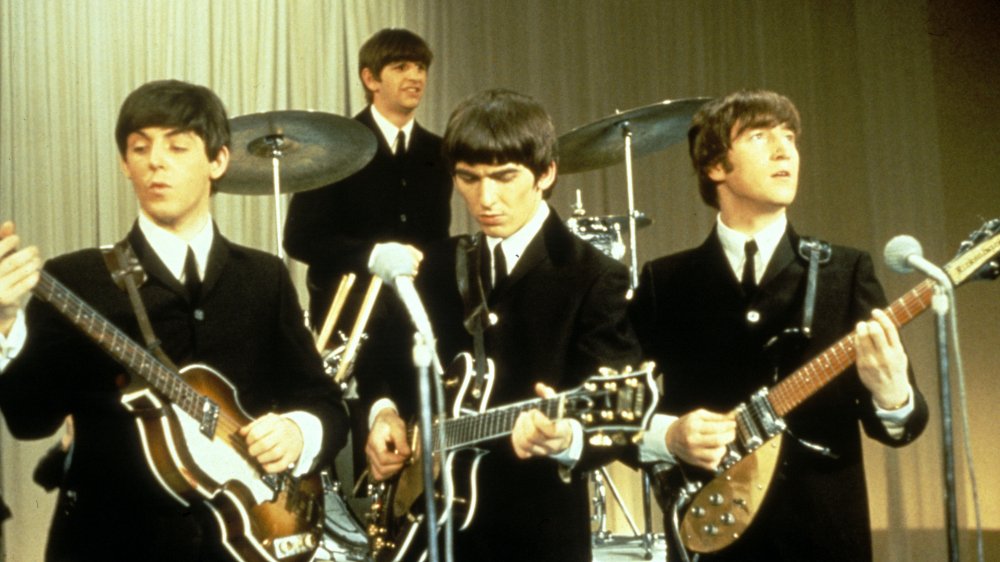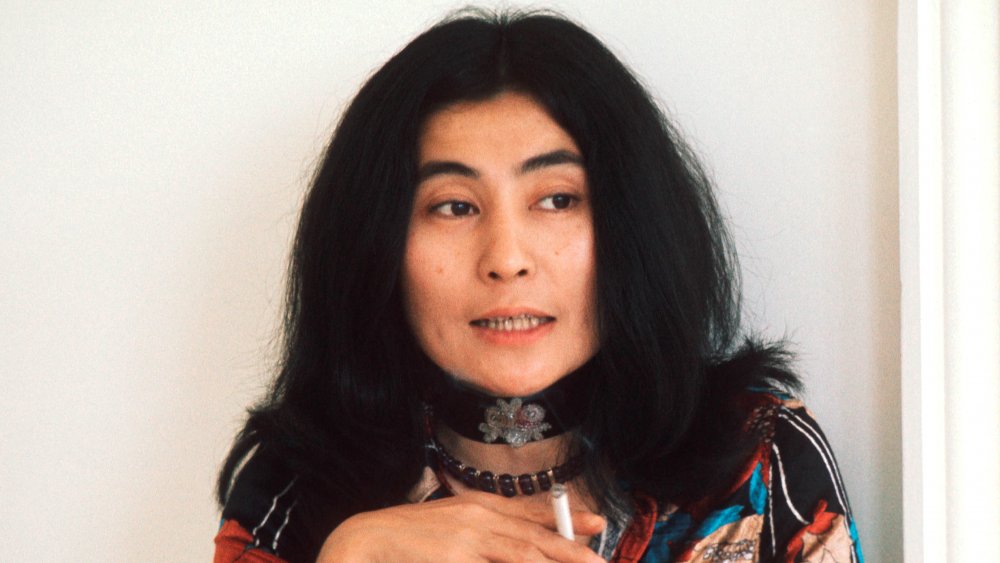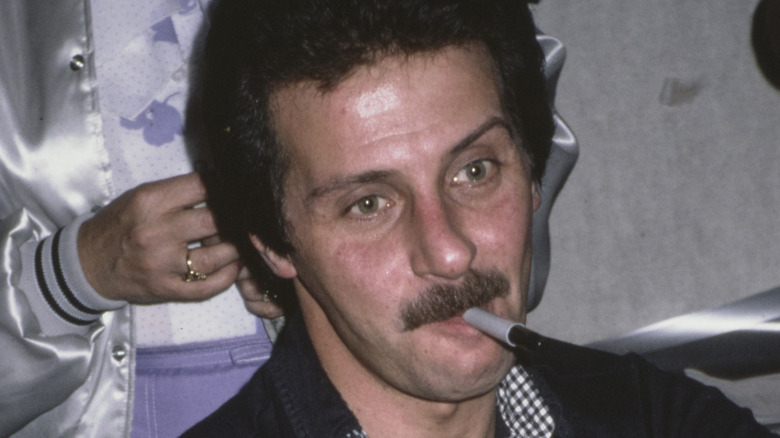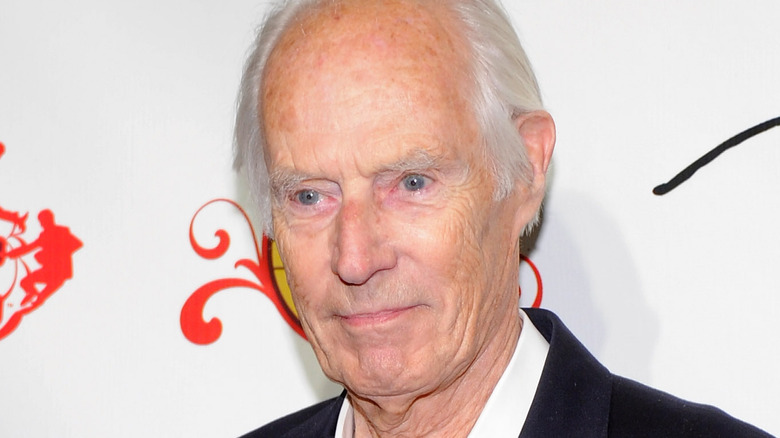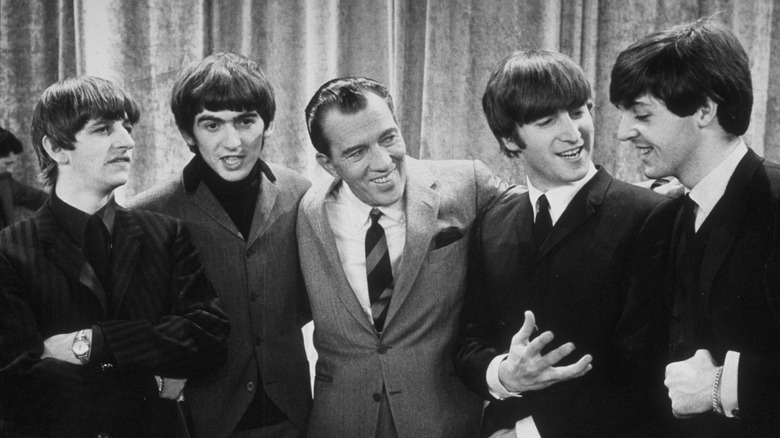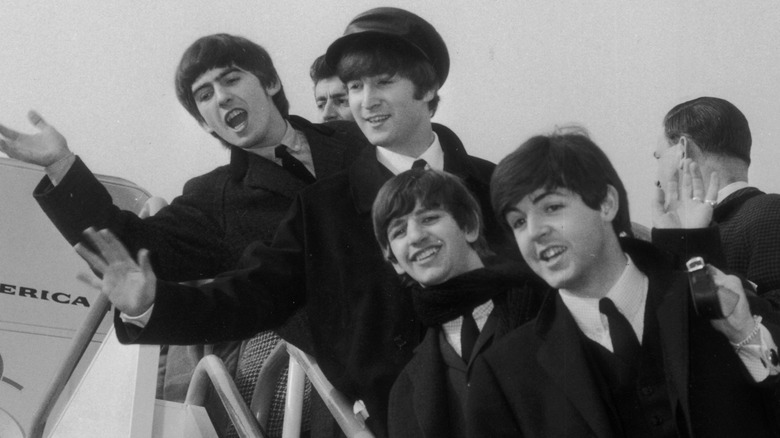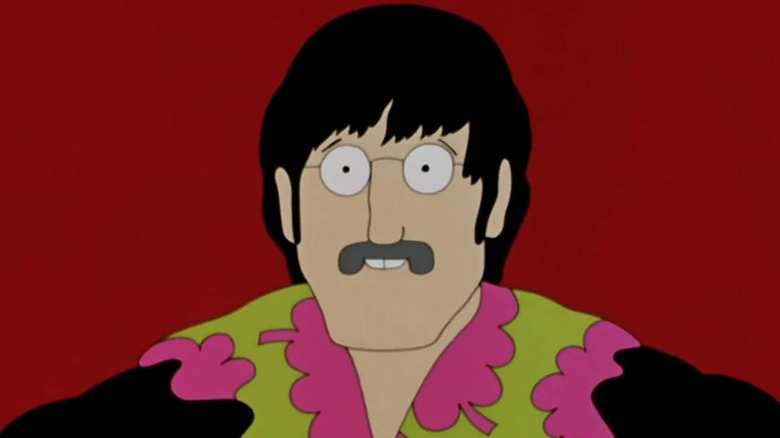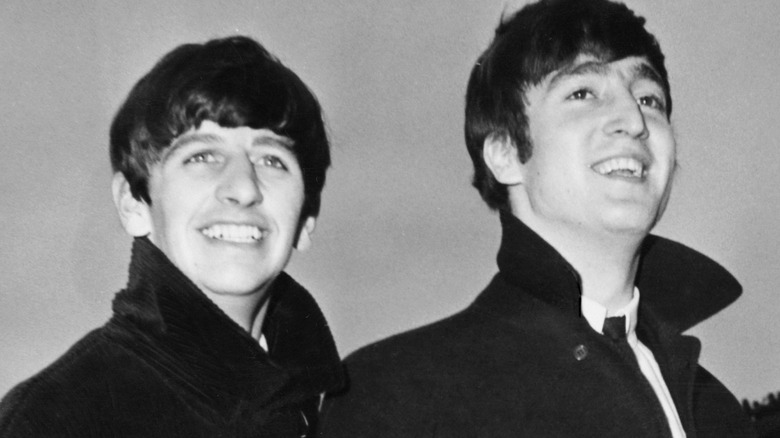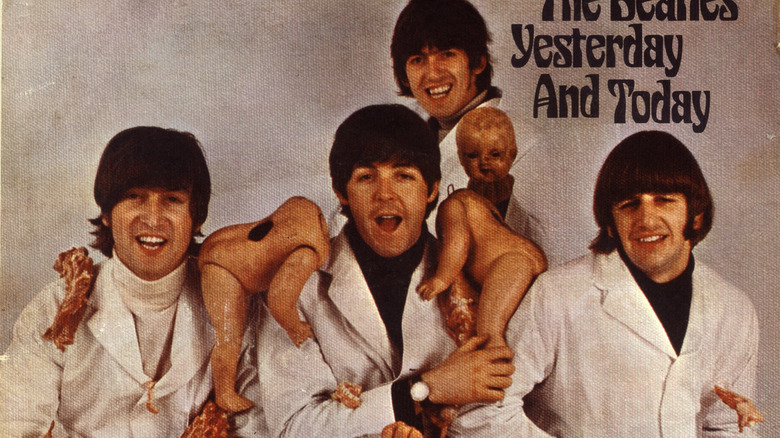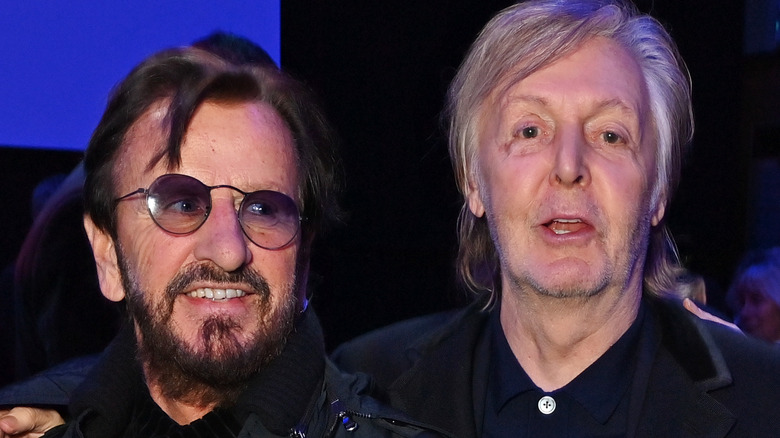Myths You Can Stop Believing About The Beatles
The Beatles are almost mythic in their position in modern popular culture. It took a lot of work and time to get there, listening to each other, listening to managers, maybe even listening to critics. And so, as with so many other things that achieve legendary status in humanity's eye, such as the moon landings being faked or just about everything to do with Robin Hood, actual myths have sprung up around the Beatles.
From Paul McCartney dying and being replaced with a double to "Lucy in the Sky with Diamonds" being an ode to LSD, numerous rumors, assumptions, and downright fantasies have dogged the Beatles throughout their career, and for decades afterward. Some may even surprise the most ardent Beatles fan.
Luckily, historians, reporters, and the band members themselves have provided all the details needed to separate truth from fiction. Here are the myths you can stop believing about the Beatles.
Myth: Paul McCartney died in 1966 and was replaced by a double
According to a story written by Fred LaBour and published in The University of Michigan's Michigan Today in October 1969, Paul McCartney was not only dead, but he'd been dead for years, killed in a 1966 car accident. John Lennon had replaced Paul with a look-alike. The clues were everywhere. You just had to look. The piece contained over two dozen "clues" — all of which LaBour made up.
The story was never meant to be journalism. "I wanted to poke fun at over-zealous critics who try to find endless meaning in every nuance of an art project," LaBour told True West Magazine in 2008. "I thought then, and in fact still do, that this was funny. Almost everybody else took it seriously." An interview with AL.com includes this nugget from LaBour: "I always thought I could have made some money off of it at Beatle conventions, but I didn't. But now it's amusing to my children."
Myth: Yoko Ono broke up the band
Another Beatles myth had to do with the often-believed rumor that Yoko Ono broke up the band. Lennon admitted that his relationship with Ono was the final nail in the coffin of his marriage to Cynthia Powell, but breaking up the Beatles? Not so.
No question that John trusted Yoko's artistic judgment and relied on her support and affirmation. She was the only spouse allowed into recording sessions. But as CNN reports, the band, which had been laboring together for years, was already starting to fragment when Ono appeared on John's arm. As Biography relates, McCartney himself told more than one interviewer, "[she] certainly didn't break the group up, the group was breaking up." Part of it was artistic, part of it was money, part of it was temperament, and part of it was simple exhaustion from being Beatles.
As for being Beatles — what about Ringo? Is it true he wasn't really valued by the other members? The fact is that as the group started to come apart, it was Ringo who was the first to walk out, back in 1968. According to Ultimate Classic Rock, the remaining three very much wanted Starr back behind the drum kit: "(T)hey soon realized they needed Starr, and sent him a telegram asking him to return, saying that they thought he was the best rock n' roll drummer in the world and that they loved him." When he arrived at Abbey Road, his drums were "decorated in flowers spelling out 'Welcome Back, Ringo.'"
Myth: Pete Best was fired from the Beatles because he was too attractive
Shortly after they changed their name from the Quarrymen to the Silver Beatles and then just the Beatles in 1960, Pete Best joined the group as its permanent, full-time drummer, joining the group for its months-long stint performing gigs in Hamburg, Germany. The Beatles signed a record deal in 1962, and weeks later, everyone who wasn't Best decided that the drummer ought to leave the band, effective immediately.
After the Beatles obtained lasting global popularity, rumors about Best's exit persisted. Theories floated around suggested that Best wouldn't cut his hair into the standard Beatles mop-top, or that he didn't get along with his bandmates. One of the most salacious and petty grievances that may have led to Best's exit, reported as fact by Beatles biographer Larry Kane in his books and in Parade, was that the band's pre-Ringo drummer got more attention from women than did the other musicians, and that made them so jealous they fired him.
The reasons behind Best's ouster were likely of the professional and musical variety. Beatles producer George Martin told band manager Brian Epstein early on that Best's drumming wasn't of recording quality, and Best himself concurred. "You're the Beatle who got kicked out because you were crap," he said of himself to The Irish Times in 2020.
Myth: George Martin was an early and avid Beatles champion
Urged along by manager Brian Epstein, the Beatles approached multiple record labels in the early 1960s. All of them, including Pye, Phillips, and Decca, all said no. But then EMI signed the group by way of George Martin, president of subsidiary label Parlophone. Martin recognized and embraced the potential for excellence that all those other record label executives had missed, and thus began a long and fruitful relationship. Martin managed and shaped The Beatles' musical output, serving as their producer, arranger, and a force that pushed them to take artistic risks and adopt new recording technologies.
While Martin got on board with the Beatles quickly, and really before anyone else in the established U.K. music industry, he wasn't all that keen on the band at first. He thought the Beatles' demo was terrible, and recommended they replace Pete Best with a better drummer. Even then, Martin thought his arrangement with The Beatles would be brief. According to an interview with biographer Kenneth Womack in Forbes, "[Martin] intended to record six record sides" — meaning 12 songs in total — "and then be done with them."
Myth: The Beatles made their American TV debut on The Ed Sullivan Show
The Beatles would go on to set a lot of pop cultural records and milestones, and shortly after their collective arrival in the United States in 1964, they got the ball rolling. On February 9, 1964, the Beatles performed on "The Ed Sullivan Show," and some 73 million viewers watched the CBS broadcast. That stood as the most watched TV program in the U.S. ever, and would remain so for years.
But that first show in February 1964 was such a watershed moment and a collective cultural experience that it overshadowed other, previous Beatles appearances on American TV, which laid the groundwork for the explosive "Ed Sullivan Show" moment. According to CBS News, the English band's manager, Brian Epstein, pitched American news networks on running stories about his clients, at the time the hottest rising stars in the U.K.
CBS News' American-born London correspondent Alexander Kendrick was sold, and filed a report, which aired on "CBS Morning News with Mike Wallace" on November 22, 1963. The piece would've repeated on "CBS Evening News with Walter Cronkite" that evening, but the breaking news of President Kennedy's assassination took precedence. CBS would once more air Kendrick's segment on December 10 – Ed Sullivan caught that piece, and it's what prompted him to book the Beatles on his show.
Myth: Beatlemania in the U.S. began with the group's performance on The Ed Sullivan Show
The Beatles set ratings records when they performed in front of more than 70 million people watching "The Ed Sullivan Show" in February 1964. And just like that, the Beatles were as big in the U.S. as they had been in their native U.K. Within two months, the band had reached their fourth No. 1 on the Billboard Hot 100 pop chart, and in one week in April 1964, held the top five spots on that list of most popular singles in the country.
"The Ed Sullivan Show" certainly gave the Beatles a boost in visibility and commercial appeal, but that was just one part of a movement that had been developing and building since late 1963. The first Billboard appearance in the U.S. for the Fab Four came way back in April 1963, with "From Me to You" reaching the lower rungs of the Billboard pop chart. "I Want to Hold Your Hand," which would become the Beatles' first #1 hit in America, began its chart ascendancy in December 1963. And according to The New York Times, filmed performance footage of the Beatles aired on Jack Paar's heavily watched TV entertainment show in January 1964. By the time of the "Ed Sullivan Show" gig, the Beatles had already placed four singles on the Hot 100.
Myth: 'Lucy in the Sky with Diamonds' is about drugs
There's a lot of circumstantial evidence or illusions that point to the Beatles' 1967 track "Lucy in the Sky with Diamonds" being a song about drugs, or the effects of drugs. Not only are the lyrics loaded with fantastical, psychedelic, bewildering imagery about "tangerine trees," "marmalade skies," and a woman with "kaleidoscope eyes," but the first letters of the main words in the title spell out LSD, or lysergic acid, a popular hallucinogenic substance. The Beatles even released "Lucy in the Sky with Diamonds" in 1967, well into its era in which band members were experimenting with drugs, per U.S. News and World Report.
And yet, that's all a matter of interpretation. John Lennon attested that the song was inspired by a piece of artwork made at school by his four-year-old son, Julian. On "The Dick Cavett Show" in 1971, Lennon denied that the song's title contained a code pro-drug message. "It never was and nobody believes me," Lennon said. "My son came home with a drawing and showed me this strange-looking woman flying around. I said, 'What is it?' He said, 'It's Lucy in the sky with diamonds.' I thought, 'That's beautiful.' I immediately wrote a song about it."
The story checks out — according to The New York Times, young Julian Lennon attended school with a classmate named Lucy O'Donnell, likely the Lucy who influenced the inspirational drawing.
Myth: John Lennon thought Ringo Starr was a terrible drummer
John Lennon had a sense of humor, but he also had a mean streak. One of the most famous examples of his acerbic, withering wit is a quip he supposedly levied at a fellow Beatle. Back in the 1960s heyday of the Beatles, a reporter whose identity is lost to time asked Lennon if he thought Ringo Starr was the best drummer in the world. "He's not even the best drummer in the Beatles," Lennon allegedly and reportedly chuffed, according to the Los Angeles Times.
While writing "Tune In: The Beatles: All These Years," Beatles historian Mark Lewisohn tried to pinpoint the origins of the quote. According to Lewisohn, the London Times printed the quote and put it into circulation, but it didn't actually come from Lennon or anyone remotely involved with the Beatles, nor did it originate during the 1960s. Lewisohn tracked and (reported on Twitter) the nasty comment on Starr's musical abilities to an October 1981 episode of "Radio Active," a BBC Radio 4 sketch comedy show. "Maybe Ringo Starr wasn't the best drummer in the world. Maybe he wasn't the best drummer in the Beatles," actor Philip Pope said, delivering a line written by Geoffrey Perkins.
Myth: The 'butcher' album cover was a coded message to a record company
In 1966, the Beatles' American label Capitol Records released "Yesterday...and Today," a compilation of singles and tracks held over from U.K.-only albums. Most record buyers got a copy in a sleeve with a generic photo of the Fab Four standing around a trunk. But there exists a rare and highly valuable alternate version of "Yesterday and Today," because its sleeve featured a gruesome image of the Beatles covered in bloodied doll parts and meat, per Rolling Stone. That edition was quickly removed from circulation, leading to the rumor, according to "The Beatles as Musicians: Revolver Through the Anthology," that the cover with the butcher Beatles was a message to Capitol — to stop "butchering" their U.K. albums for American fans.
Here's what really happened. In 1966, the Beatles sat for the butcher-themed photo session with artist Robert Whitaker. When Capitol wanted a cover image for "Yesterday and Today," the band sent in a Whitaker photo. Multiple high-ranking Capitol employees balked, but the Beatles held a lot of clout; besides, Paul McCartney claimed that the photo was a reflection of the group's opinion of the Vietnam War.
Capitol printed a full run of "Yesterday and Today" and sent out thousands of advance copies to record stores around the country — many of whom refused to sell the LP as was. The Beatles then authorized Capitol, at tremendous cost, to recall, revise, and reprint the sleeves.
Myth: The Beatles never reunited
In late 1969, John Lennon announced he was leaving the Beatles. Paul McCartney followed suit in 1970, effectively splitting up the group. And unlike so many other classic rock bands who reconvened with their full original lineups at some point down the road, the Beatles never did.
However, multiple groupings of former Beatles continued to work with one another over the years. McCartney contributed to multiple Ringo Starr albums, and the two former bandmates performed together live as recently as 2019. Lennon's assassination in 1980 prevented a full, technical, and traditional Beatles reunion from occurring, but just before his death, according to The Washington Post, the former Fab Four were on good enough terms to start planning a reunion for a charity concert.
Starr and McCartney joined George Harrison on the latter's 1981 Lennon tribute single "All Those Years Ago," and the three briefly sang together in 1998, unrecorded, at the funeral of McCartney's wife, Linda McCartney, according to The New York Times. And in 1995, 25 years after splitting up, the Beatles as a unit scored their final original top 10 hit in the U.S. with "Free as a Bird," according to The Beatles Bible. The three surviving Beatles recorded new tracks to accompany a vocal demo left behind by Lennon.
